Locksmiths Top Tips For Locks and Security
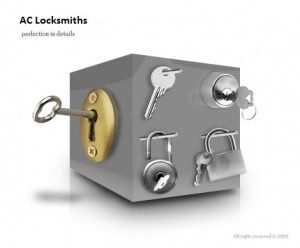
1. Instead of leaving a key in your back door, take a back door key with you when you leave the house. Almost every time I attend an emergency where my customers have lost their keys, they show me the back door with the key in the other side. Carrying a key for the back door in a separate pocket to your front door key gives you a greater chance of being able to get in without waiting for a locksmith. It is also better for security because all the time a key is in your back door, a burglar can break in through a window and easily carry stuff out of your house through that back door!
Leaving keys in doors is good fire safety practice while people are in the property, but they should be removed from locks if the property is empty.
2. Oil your locks regularly – at least twice a year. The best way to remember is to do it every time you change your clocks, w
This is especially important if you live near the sea. Don’t just spray where the key goes in. Most locks have a latch that retracts when you pull the handle down, when the latch retracts, the wedge makes a gap for your oil or silicone spray. Spray for around 5 seconds to get plenty inside, then turn the key a few times to make sure the lubricant reaches all parts. If you have a locking mechanism with lift up handles, works the handles up and down a few times, but make sure you lubricate all moving parts (bolts, hooks, rollers, etc.)
3. Do not put your override keys to your safe inside the safe. Equally, do not leave the override keys anywhere in your property. A burglar can find those keys and get to your valuables. They will know the hiding places you think are sneaky.
Safe keys should be with a trusted friend or family member in an entirely separate property. Also, do not wait for the batteries to get low. Change them annually whether they need it or not. Always consult a security expert before buying a safe because they can advise you on the pitfalls many are trapped by. There is nothing worse than needing your passport from a safe you cannot access and finding out the safe expert cannot get to you for two days by which time, your plane has departed!
4. Please stop posting on social media all about your holiday whilst away. Your friends probably don’t care as much as you would like to think, but the burglar is very thankful you are advertising that your property is empty. Don’t ruin your holiday by coming back to find all your valuables have been taken. You can post your holiday highlights when you get back.
5. When you get extra keys cut, use the originals most. Badly cut keys ruin locks. Key cutters use generic key blanks made from cheaper metals. If you buy your locks from a locksmith, they can order branded keys made for the lock cut from superior metal. These will then be covered by guarantee. Once you use a poorly cut off brand key, and it damages the lock, you invalidate any guarantee given by your locksmith. So if you must get spares made, try to use the originals the most.
6. Be wary if you have a family member who suffers with dementia. This is a sensitive subject but I have experience of a good number of customers coming back to me because they have lost their keys. The excuses are often the same, with angry accusations at neighbours or carers who have ‘let themselves in and stolen my keys again.’ The last thing a locksmith wants is to take advantage of anyone with this awful condition, but we cannot change locks for free. We also cannot ask the customer for phone numbers of family members because it is not right to do so.
If your loved ones are getting forgetful and you notice new locks, firstly try and get a key for yourself. Then, see if you can find out which locksmith they used. I would be more than happy if you called me to say you are MR X’s son/daughter and that if Mr X should call me in a muddle, I should try and call you before setting off to change the lock again. Mr X will be far happier having you search for the key he has hidden and forgotten than me. I would expect any decent locksmith would feel the same.
7. Next to your mobile phone, your lock and keys are the things you use the most almost – every day for that majority of us. Treat them accordingly. When I take handles off of doors, I find a variety of spider carcasses, wasp larvae, rust and other muck. While unscrewing and re-screwing the fixings too many times is not good for the wood, occasional cleans behind the handles is not a bad idea. You might well discover broken springs and other nasties that need seeing to. Better to catch things early before they fail completely and you find yourself unable to get in.
Likewise, I have come across many a door where someone has simply painted over the lock while decorating. It doesn’t take many seconds to undo the screws and remove the lock while painting and even less to put a bit of masking tape over the area. Painting over the lock is not good. At best, the screws fill with paint and when you do need to take the lock out because it has failed, you cannot undo the clogged screws without extra effort. Locks might not be as exciting as a phone, but they are more important.
8. Do not leave keys on a flat surface or hanging up anywhere in the vicinity of a door with a letter plate, especially if you have windows through which the keys can be seen. If I can put a mirror through your letter plate and see your keys, I can retrieve them, which means a burglar can do the same. A letter cage on the back of your door is amazing security, especially if you have a thumb turn rather than key operation on the inside. Better still, seal your letter plate and invest in a separate post box to fit externally.
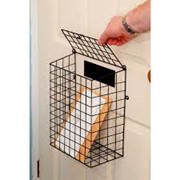

If you have any questions about the above content or any else security related, please feel free to contact me.
See my customer testimonials here
Thanks for reading
Lock changes for landlords
If you own a holiday let property, you should be well aware of the new fire regulations that suddenly hit last summer. I know many of you have been spending all your profits to ensure your properties are up to scratch for the coming season.
But what about long term lets?
Well, if you read the fire risk assessment that has to be carried out by holiday let owners, it states “any property you pay to stay in.” If that doesn’t already mean long term lets, then it certainly will if the government of the day decides that the measures taking place with holiday lets are a success. After all, the more they make you spend, the more they get in tax.
If you own properties that you let out to tenants, then it might be an idea to get ahead of the curve. Locks are being changed all the time through abuse, lost keys, evicted tenants, etc. What better time than now to make sure that the new locks going in are keyless escape versions. In the event of a fire, your tenants can get out quickly without having to find keys in a panic situation?
AC Locksmiths Norfolk can change your locks for you, We will ensure that all replacements are kite marked products, so all insurances will be valid.
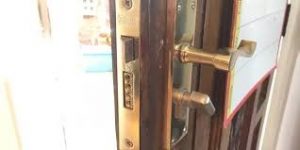
But while thumb turn (escape) locks are great for getting out easily, they can be a reduction in your security. There are tools that can go in through letterboxes and rotate the inner thumb turns, it is important to consider options to cancel this short fall. Letter catching cages are a great remedy to this, or mounting a post box outside your house, while disabling any door positioned letter plates is even better.

Changes are coming. I have spoken to several holiday let owners who have changed locks recently, only to have to change them again in light of the new legislation. It’s worth thinking about being ready for the inevitable.
Any questions regarding the above, please do not hesitate to contact me through any of my contact methods. https://www.ac-locksmiths-norfolk.co.uk/contact-us-here/
Thanks for reading.
Landlord lock law change:
I have just been reading through the Home Office Document: ‘A guide to making your small paying-guest-accommodation safe from fire.’ A guide to compliance with fire safety law for those responsible for safety in small paying-guest-accommodation’
You can find the document here
Note this says fire safety law and therefore is the legal requirement of all landlords, certainly for those with holiday lets. I would argue long term tenants are also paying guests as they have no right to remain when a landlord decides they want their property back for any reason.
Speaking to a letting agency recently, I have also discovered that it will be expected of all landlords to read the document and comply with all points mentioned. You won’t always get a risk assessor to check things for you. You, as the landlord are entirely responsible should a fire break out. It is quite heavy reading and most of it is obvious, but it is my job to point out relevant issues to my own line of work.
In section 6, there is this statement:
‘Exit doors, such as the front or back door, should always be easy to unlock and must not need a key to unlock them from the inside. A simple latch or thumb turn is usually good enough. However, you may need to consider whether all guests are able to open these doors. A simple single action turn handle or lever will often be more appropriate.’
This means you must have a lock with a thumb turn on the inside. Something like this:
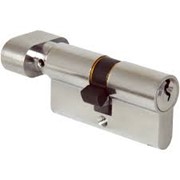
On all upvc type doors, this is simply a matter of changing the cylinder. On doors with mortice (often called ‘Chubb’ type) locks, you will need to change the lock, handles and purchase a cylinder. And while thumb turns are great for fire escapes, they do pose a security risk as it is possible with certain tools to go in through the letterbox and rotate the thumb turn to gain access. Therefore any locks with thumb turns on a door with a letter plate, should also purchase a letter plate guard to alleviate this problem.
The point is repeated on the checklist included in the document: ‘Are frequent checks carried out to ensure exit routes are kept clear and fire exits remain easily openable?’
That is your prompt to make sure no one can lock a door, remove the key and then be unable to get out while panicking in a fire.
October the 1st is the current date for this to become law over advice.
If you have your work done through AC Locksmiths Norfolk, you can expect to pay £55 for a kite marked thumb turn euro cylinder. These can be brass/gold, chrome, polished chrome, dual finish, black or white. An average of £50 to replace your mortice lock with a mortice euro lock case. Handles start at £25 but average at £45. More ornate handles such as wrought iron up to £200. In all cases, a labour fee of £75 is payable. (All prices correct at time of writing, but please get binding quote at measuring stage). In almost all instances, a measuring visit will be required. This is free to all properties within a half hour drive of Holt, Norfolk.
Should you have any questions regarding the above information, please do not hesitate to contact me; 07846643176
Thanks for reading.
New laws implemented for holiday lets
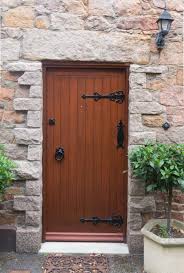
Very soon, all holiday let properties are going to be required by law to be keyless exit in case of emergencies. For properties with UPVC or similar doors where the handle needs to be pushed up before locking, the lock changes are straight forward and the existing cylinder just needs to be changed for one that has a thumb turn on the inside rather than a key.
But if you have a wooden door with a mortice (Chubb type) lock, then you will need a complete conversion kit consisting of replacement lock case, thumb turn cylinder and Euro cylinder handles. Most of this is straight forward, but sourcing handles to match your existing ones can be a drain.
If you do not get this work done and your tenants have an emergency, there will be no cover from your insurance should the worst happen due to them not being able to escape.
Here at AC Locksmiths Norfolk, we are happy to work around your changeover days and with your management company to get the locks changed seamlessly without hassle for you or your customers.
Should you require any more information, please contact me for an informal chat.
It is well known that business properties, especially where the public has access, should have secure fire exit doors, which means that all locked doors should be able to be opened from the inside without a key.
But many people renting out properties for holidays do not realise that these fire exits should have easy escape capabilities. The logic behind this is that if the lock is key operated on the inside, the customers may well lock the door, put the key somewhere safe, and then should the worst happen and a fire break out, in their panic and being away from home, they could well forget where they have put the key and be caught in a tragic accident.
So if your wooden door has a nightlatch (often called a ‘Yale’ lock), and that lock has a British Standard Kite mark, you are fine.
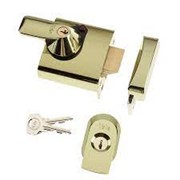
If your wooden door has a mortice (often called a ‘Chubb’ lock), with key operation on both sides, there is a conversion that can be done to use a Euro Cylinder that has a thumb turn on the inside. This means changing the lock and handles but can use the existing space with minimal visible change.
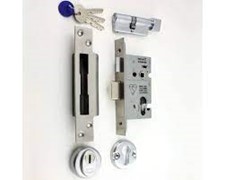
If your door is UPVC or has any mechanism where the handles must be lifted before locking, it is a simple matter of swapping the existing Euro Cylinder for one with a thumb turn on the inside.
This is a key both sides Euro Cylinder: 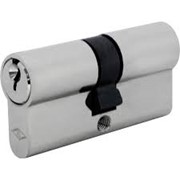
And this is a standard thumb turn Euro Cylinder: 
There is a slight worry with installing these fire escape systems, though and that is I have a tool that can go in through letter boxes and turn the thumb turn allowing me access to the property. We have two solutions. Firstly, certain thumb turns on the very best cylinders are designed to be difficult for tools to turn. They might require a push while turning or just plain difficult for the tool to purchase.
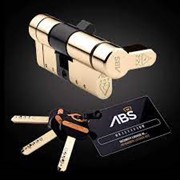
Alternatively, you can buy specially designed sloped guards for your letterbox (although even these can be bypassed with ever more clever locksmith tools).
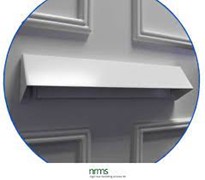
Or better yet a letter catching cage on the back of your door will stop all tools that I know of at time of writing.

If you own or run holiday lets, you might find your public liability insurance does not pay out if you have not taken the correct measures to ensure the safety of your guests.
I am noticing a lot of village halls are also suddenly finding out from fire inspections that they are not up to scratch. Please check the regulations specific to you if you run any property that is not a private home.
Click here for Government guidance on fire doors/fire safety
Should you have any questions regarding the above information, please do not hesitate to contact me.
Thanks for reading.
Common key & lock mistakes – And How To Avoid Them

It has been a while since I have produced a blog helping you to avoid needing to call out people like me. So here is a short list of common, avoidable mistakes people make that might just help you not make those same mistakes, hopefully saving you time and money.
Safe Keys
Putting override keys inside your battery operated safe: Safes are great, but if you have a key operated safe, the safe is only as good as the place you hide the key. People are quite obvious in hiding places, so digital safes are a lot better then simple key turn safes. The only problem is that digital safes have master key overrides and the safest place for these keys is in the safe itself. But if you only use your safe rarely there is a good chance you will forget about it, It gets placed in a built in cupboard, covered in clothes and out of sight, out of mind. The batteries start to die and because it is covered in clothes, you don’t hear the warning beep and pretty soon, you have a keypad that you cannot use. Thankfully, you have override keys…. But they are inside the safe. At this point, you can call a domestic locksmith who will gain access by destroying your safe and you will have to pay him for the privilege. You then have to buy a new safe. Potentially £100s because you forgot to change the batteries and left the override keys inside the safe. You can try a safe specialist to come and pick the lock, but the cost might still be £100s because safe specialists are rare (the courses and equipment are expensive) and they don’t get many calls compared to standard locksmiths.
How to avoid disaster? Firstly, take those override keys and trust a family member/good friend to look after them for you. If their house gets broken into and a burglar finds your safe keys, they have no idea what safe they open or where it is. But if they find those keys in your house, they can get into your safe. So, get those keys away from your property. Surprisingly, now your keys are not easily accessible in your safe, you will be more likely to check your batteries! But don’t rely on that. Check how long your safe manufacturer says batteries should last and halve it. Write on the calendar when to change the batteries. Use the old batteries for something else, but keep new batteries in your safe. I love Autumn and Spring because we change our clocks and this gives us a great time to do other things like regular battery changes. Have a list of other maintenance things to do like pre-winter gutter cleaning, etc, and put safe battery changes on that list. This will ensure that if you do have to call someone to open your safe, it will be because something has gone wrong rather than having to explain an expensive memory failure.
Car keys on holiday
I wish I had a sum of money for every time someone called me to say they lost their keys on the beach and the spare car key is 400 miles away on the other side of the country… Oh wait, I do! When you drive somewhere on holiday, take your spare key. When you get to your hotel/air B&B/caravan, etc leave your key somewhere safe at your destination. If you lose your car key, it will be a lot cheaper to get a bus/cab back to your holiday base than it will to call an auto locksmith to come and make a new key on the spot for you. A lot quicker too. Even when you go out on a normal day, if you have someone with you, get them to carry the spare key. If you bring the spare out and leave it in the glove box, you are making life difficult for everyone except car thieves.
Letter boxes
Sticking with cars, most cars are stolen from driveways or outside homes using the keys which have been lifted – either because the front door is left unlocked, or the thief has fished the keys through the letter box. Tools for opening locked doors via the letterbox are getting cheaper, easier to use, and ever more sophisticated. Even if you have an angled guard, there is a tool that goes around it. You might think this is a step back to your Grandma’s house, but a letter basket with closing lid, is a great way to foil the letterbox thief. Better still, seal up the letterbox, and have an external box. If you have room, get one that is big enough for parcels, We get so much delivered these days, a lockable parcel box is a great idea. At the same time, door cams record anyone approaching your door and will have images sent to your phone before they can vandalize it. But I digress..
Copy keys
If you are renting out a holiday home or have multiple carers, etc, get a locksmith to install a new lock, with all new, branded additional keys tried and tested before the lock goes in. Almost every time I get called back to job where the lock has failed, the customer shows me a key that has been copied elsewhere on some poor-quality blank. If you get keys copied and they foul up the lock, that is invalidating any guarantee the locksmith gives you, but if you are using additional keys supplied with the lock at time of installation, you are completely covered. But, if you must get copies made, make sure the original keys are the ones that get used most. I.E. let the guests use them. Yes, they might lose them (less likely if you request a deposit), but if they have poor quality keys and the lock fails and they are locked out waiting for a locksmith who destroys the lock getting in, the cost just multiplies. If you need multiple carers, please get a keysafe. It is better than having to collect keys later and ensures better keys are used.
5 lever locks
Know your terminology; there is a difference between a five lever mortice lock and a multipoint locking system. If you have a wooden door the mortice lock, (often called a ‘Chubb’ lock) is the one that should be 5 levers. If you look at the front plate, It will tell you that it is either 2, 3 5 levers and preferably will display a British Standard kite mark that tells you it has been tested against picking, drilling, sawing and most other forms of attack. If you have a door where you lift the handle and various hooks/bolts/mushrooms, etc. move, this is not a five lever lock. This is a multi-point locking system and your insurance is happy with that, which is bizarre because these systems are only as good as the locking barrel you put your key into and insurance companies are yet to wake up to how easy these can be to bypass. Again, digressing, but please talk to your local locksmith about kite-marked barrels. And if your architect/builder/designer tries to tell you these new multi-point doors without handles are a good idea, ignore them. When there is no handle, all the force of opening the door goes through the key. The leverage ratio is tiny compared doors with nice big handles, and at some point, you will snap your key in your lock.
Complacency
My last one for this blog; Just the other day, I fixed a basic lock on the top half of a stable door. It was not insurance compliant. When I challenged the customer regarding this and told him that his insurance company would not pay out if he were burgled, he replied with one I have heard often: ‘This is Norfolk. Although I know someone in the next village got burgled and lost a lot, it’s highly unlikely I will.’ So why pay for insurance at all? If you are paying for insurance, you owe it to yourself to make sure you are compliant. A second house this week is having three locks replaced after one has stopped working. I pointed out the three locks were all 3 lever and not insurance compliant, so the customer in this case, ordered new locks without delay. If you have an older house, don’t just assume the locks are up to spec. Most decent locksmiths do a free security check and, speaking for myself, when I do security checks I will tell you where advice is necessary and where advice is just personal recommendation.
This article about insurance required locks is quite good.
Should you have any questions regarding the above, please get in touch.
Thanks for reading
New Smart Ways to be secure

No, I’m not talking about locks linked to your smart speaker. As world events make everything more expensive I’m talking about ways to shop smart. I thought this as recently I upgraded the security on a home in a local new build estate. Soon, I had a neighbour asking on recommendation for the same upgrade. That turned into five properties, all occupied by people who knew each other. For me, it was multiple journeys to the same area, multiple measuring visits, multiple ordering from my supplier and multiple deliveries. Had these people clubbed together, I could have done all the work in one day. I would have measured up all the properties on the same day beforehand, thus saving myself costs that I would have passed on to the customer. Those customers could have saved themselves £50 each by clubbing together on the labour charge.
Home security is important, but like everything else, the cost is rising. So if you are thinking of upgrading your locks, putting in some CCTV or an alarm, talk to your friends, If they are local, I will happily split a labour fee between you if it means I save on massive fuel bills. I will visit both your homes (or more) for free security checks, tailor the hardware recommendations personally and then when the work is done, split the labour cost evenly between you.
What about giving security as a gift? We all know a relative that might have outdated locks, don’t we? Well, why not club together with family members and buy them a security upgrade? (It could make a nice change from pants and socks or bathroom smellies.) You would be getting them something they would be using every day for a long time to come. On my rounds, I see so many older folk struggling with doors that have floppy handles or need a ‘knack’ to make the key work. Next time you visit Mum and Dad, plan something worthwhile for their next birthday or Christmas.
And just in case you were wandering how far this locksmith will travel, I am happy to come to you in North Walsham, Aylsham, Fakenham, Cromer, Stalham, and all the places in between. I even venture into Norwich.
My security checks are always free and there is never an obligation to take up my quote. 1st homes or 2nd homes, holiday lets or commercial properties, your security is my business.
Thanks for reading.
‘Skilled locksmiths are not cheap and cheap locksmiths are not skilled.’ This blog piece is an explanation of costs when you call a locksmith.
Continue Reading →
National Home Security Month

You probably won’t know this, but every October in the UK is National Home Security Month. October was chosen for a reason and that is because it’s when the evenings are noticeably darker. That makes it easier for the burglar to know when properties are occupied, and it makes it easier for the intruder to hide in dark corners. Garden hedges are a fantastic place for intruders to hide if they think they have been caught in the act, and they will actively seek out properties with large, softer hedges as potential hiding spots at night. A plain fence might be boring, but it can be the difference between you not being burgled as a matter of choice, over your neighbour.
One of the interesting facts that I read in my magazine for lock geeks this month was that while cylinder snapping is still the number one method of entry (less than 60 secs with no power tools if you only have standard locking cylinders on your UPVC/composite door), a growing number are using the garage where there is a connecting door from the garage to the house. Garages and sheds are notorious for poor security anyway, so these overlooked entrances are an easy target. When the connecting doors often have only 2 or 3 lever locks, there are simple tools that do the job.
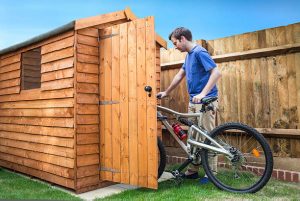
Recently I had to gain entry to a property where one partner was denying the other entry over a domestic dispute by leaving a key on the inside of the lock. The locks themselves were top level and ordinarily, would have put me off, but I knew the key was on the other side. Once I checked my customer had legal right to enter the property, I started work. I have an ‘outside in’ tool that goes through the letter box and allowed me to rotate the key and open the door. My point is this, no matter how good your lock is, if you leave a key on the inside of a door with a letter box, or have a thumb turn on the inside, you might as well not bother locking your door. The letterbox is a massive temptation for thieves. Many people leave car keys, door keys and the like on surfaces near front doors. It is very convenient after all. But thieves can go fishing through letter boxes and easily reach things you thought were safe. A good cheap deterrent is a letter bin that goes over the inside of the letterbox. Your newspaper delivery person will not thank you, but you will be more secure. Better still, get an external post box and seal your letterbox completely. Your locksmith won’t thank you if you lose your keys, but he/she will admire your security consciousness.
On that note, there are now safe lockable delivery boxes for all the large packages we now receive from the likes of Amazon. Having watched hours of doorcam footage on Youtube of doorstep thieves, I cannot recommend these enough. Please enquire if you would like more information.
Back to this dispute case; At the same house, I was asked to open the garage. As I said above, garages are often terrible in terms of security and often hold great bounties for opportunists who have time to sell stuff on ebay or at car boot sales. The front up and over door was actually quite secure. I could have opened it with time consuming picking or drilling, but the side human entrance door was poorly fitted and although there was a good five lever mortice lock in place, the gap between door and frame was so big, I popped the door in seconds. As there was a lot of high value stuff being stored in this garage, the security was woefully inadequate, but very normal in comparison to what I see on a daily basis. My point is, do not overlook the security of your exterior buildings. Normally I say one good lock is a good enough deterrent, but on buildings with flimsy doors where we increasingly keep valuable stuff, two locks are going to slow down the intruder enough to make him consider going elsewhere for an easier target.
If you have any questions regarding the above, please do not hesitate to contact me by phone, email or the contact section of this site.
Thanks for reading.
Changing the locks on a brand new property
There seems to be a massive drive to build new homes lately. Almost everywhere you go, you are bound to be driving past a new build construction site. You might even be looking at a nice newly built home in your area, or even bought one. The beauty of a new home over an older one is that you can move in knowing you have nothing to do. The carpets are already fitted to your criteria, the sparkly kitchen gleams and there is no worry that some random neighbour has a spare key to your home, so why are we advising changing the locks on a brand new property?

Why change the locks?
Quite frankly, the developers will do the minimum possible to meet regulations, and currently in the UK the regulations just are not up to the same level as the burglars. New homes are all being built with multi-point locking mechanisms and while all the hooks, bolts and rollers look impressive and secure, the system is only as good as its’ weakest part, which is the locking cylinder. While standard locking Euro Cylinders are acceptable for insurance purposes, they are incredibly weak to a form of attack called ‘cylinder snapping’. Property developers will use these standard cylinders wherever possible.
Some of the more reputable developers will at least have the decency to install kite marked Euro cylinders in their doors, but beyond the kite mark, there are still three grades of security, which cover the three main forms of attack, those being snap, pick and drilling. So a cylinder with one star will be proof against picking but not the other two, and a cylinder with two stars will still be susceptible to attack by one of the three main methods. You can supplement the star rating by having anti-snap collars placed inside the handles, or anti-drill handles. You may even have these, but if you don’t know, then the burglar doesn’t know either and he is likely to have a go, fail and leave your door a mess before he leaves. Only a three star cylinder should be used if you want the burglar to go away before even trying.
With total honesty, there is a tool that can be purchased to bypass even some of the best three star cylinders, but it takes time use and is fiddly. Entry with this tool is trial and error, sometimes taking many minutes to get in the door, whereas a standard cylinder can be snapped in under 60 seconds with household tools and no sound. For the same reason a burglar will not take the time to remove your roof tiles and enter that way, he will not purchase a tool that takes him many times longer to get in than the cheap tools he can get from a DIY store.
Cylinder snapping is no longer about normal burglary any more; Intruders know that most people leave their car keys somewhere in the vicinity of the front door, be they left on a surface, hanging on a convenient hook, or just in a coat pocket. They can now look for the car they want to steal parked nicely on your front drive. As most of us are now two car families, at least one will sit on the drive, and if that car is your brand new Mercedes or BMW and you keep your keys close to an easily attacked door, your insurance might decide not to pay out because you didn’t take enough care. How many people tell their insurance the car is kept in the garage, knowing that actually the garage is full of the toot we don’t want in our actual houses? Breaking into a house and stealing the keys is now the easiest way to steal their car.
And while a barking dog is a deterrent to some degree, what protects your home when you are on holiday or even out walking that dog?
Most three star Euro cylinders are visibly different to standard cylinders. They shout at the burglar you are serious about home security and that attacking your home is going to be noisy and time consuming. Noise and time are the enemy of the burglar. If he knows breaking into your home is going to be noisy and take up precious time, he is going to move on. If you fit the proper cylinders, chances are you will be angry with the locksmith after years and years of never seeing any signs of attack. You will never know how many intruders scouted your home and mentally noted to leave you alone. It’s not hard. I help my kids with their paper round, and the best locks stick out like a sore thumb. I know exactly how few there are and where they are. A potential intruder only has to deliver some bogus leaflets in any area to work out who is best avoided.
While on this subject, an emailed question asked if it worth putting extra strength glue in an externally beaded window so that if the burglar got the beading off the window would still be stuck in place. Beading removal was never a hugely popular method of attack. There was always too much potential to make noise and take a long time. Also, the risk of breaking glass and then cutting oneself is too high, even without extra glues. Cylinder snapping is quick, quiet and easy. So faced with a choice, you should always upgrade your cylinders.
If you have standard cylinders or even kite marked one star cylinders, you should upgrade now. If you don’t know what you have, a good locksmith in your area will come and assess your locks via a free security check. Unless a locksmith has provided your locks, I very much doubt they will be the best on the market. You cannot buy the best locks in the DIY shops. While you are ensuring you have the best locks, you should be sending a copy of this information to everyone you care about, because of the following reasons:
- Burglary is on the rise.
- Traditionally ‘safe’ areas are being burgled more often.
- Only a tiny fraction of burglaries get investigated by police.
- You are now at risk from car thieves as well.
- Burglars pass on information to each other, so if you are burgled once, you stand an increased chance of being hit again.
- Every person I speak to who has experience a burglary, reports feeling of personal violation, sleepless nights and detachment from their home.
If you have any questions regarding the above information or any of the other blogs I have written, please get in touch via any of the methods on my contacts page.
Thanks for reading.
New build Holt, New build Fakenham, New build Aylsham, New build Cromer,
New build North Walsham, New Build Norfolk, Locks Holt, Locks Fakenham,
Locks Aylsham, Locks Cromer, Locks North Walsham, Locks Norfolk














